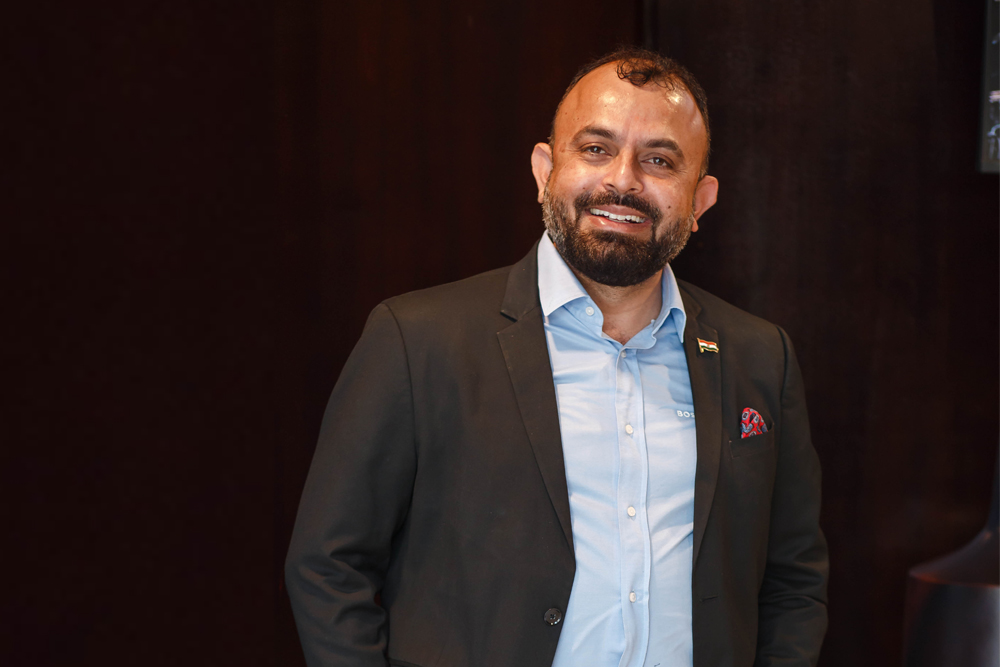
Santosh Tamrakar
Managing Director, IMS Software
Santosh Tamrakar, Managing Director of IMS Software, was always interested in Information Technology, but with a focus on sales and marketing. “I have always been more of a people’s person and love interacting; that’s my forte,” he says. To gain insight into the tech world, he went for higher studies to the United Kingdom to pursue computer science. He retuned to Nepal in 2004 and joined IMS Software as a Marketing Executive. At this point IMS Sofware was in the startup stage. In 2007, Tamrakar was promoted to the position of Chief Marketing Officer. Understanding the potential of the IT sector, he acquired a share in IMS and has since been leading the company as its Managing Director. In this edition of Business 360, Tamrakar talks about his journey and how the IT sector has evolved over the years. Excerpts:What are the basic services IMS provides?
We are involved in providing software solutions to the retail and supply chain sector like department stores, FMCG companies and even restaurants. Since our establishment in 2000, we have been providing our services to companies not only in Nepal but in India, Malaysia and Japan. Global brands like Patanjali, Nestle and Dabur are associated with us. We give the companies a solution where the solution takes care of their inventory and accounting, the whole ecosystem actually. So, whenever any company approaches us with a problem we give them an entire package whereby their problem is solved to the last detail. For instance, our point of sales (POS) software has three modules – inventory, accounting and billing. Previously, people didn’t have computers in their offices but these days every office or medium-sized store will have a computer to keep their records and people are looking for such software because they want to keep track of their inventory, accounting and so on. POS is our main software and we have about 9,000 customers utilising it at present."Many people might not believe it but the IT sector in Nepal has changed and grown rapidly, such that we have begun competing with foreign IT companies too. For example, we are working for Patanjali, an Indian giant. The fact that we are located in between India and China, two technologically advanced countries, has also helped us a lot. There is a huge market out there and the beauty about IT is that there are no physical boundaries for work."
How has the market evolved over the years since you joined IMS?
The market has gone through a total transformation. When I joined IMS, the market was not ready to convert from traditional account keeping, book keeping or inventory control to faster computer-based systems. In the beginning, we had to actually educate our customers about what a software is and how it would help them maintain records. Only after they were convinced, would they actually buy our software. But what we must understand is back then people did not have computers because they were so expensive and moreover, traditional business persons did not want their accounts to be put up in a system. Even selling a finger print attendance system was difficult then because people thought their thumb impressions would be mis-utilised. We had to literally educate people that their thumb impressions would not be stored by the system and it was all about binary codes. To compound the problem, people were also not very computer literate and many would not believe what I was saying. But now even the smallest of offices have a finger print attendance system or some electronic device for the purpose. People may not believe this now but even the banks were not very welcoming about electronic systems. Now, people have realised that they need a software to maintain records and we just have to inform them about the various software products we have. In fact, people have started asking us to customise their software. Back then, it was first about educating the client, and now it is about informing them of their choices.What do you think has contributed to the growth of IMS?
If we talk about Kathmandu valley alone, there are around 250 software companies like us. Fundamentally, we are all doing the same thing but what separates us is that we do not just sell a software. We provide our clients a solution. We talk to our clients and understand the problems they are facing, and only then do we provide them with a solution. Even after selling our software, we ensure that the problem has been resolved completely and we keep interacting with our clients. I feel our biggest strength has been our after-sales service. We provide our services round the clock, 365 days a year because any client could face a problem any time of the day. We are always ready to help.
How do you view the growth of the digital marketplace in Nepal?
It is just a matter of time when everything will go digital. It’s not about ‘if’ but ‘when’. Visiting shops or department stores and browsing through the shelves will become history. People these days do not have the time and also when everything can be done from the comfort of the home, why take the trouble to go outside. One good example is the proliferation of digital banking transactions these days. At least in Kathmandu, nearly everybody has adopted one or the other digital wallet and people have stopped visiting even ATM terminals. Even banks are encouraging their customers to go digital. Very near in the future, I believe our transactions, be it in shops or banks, will be paperless. It will take time for this to evolve but that is the future. Everything will be in the digital space because data will be the most important thing. Even now whoever has the most data is the king. Look at Facebook, Twitter, Google, they have so much of data. In the coming days, whichever entity has the most data will lead the world.Does Nepal have the qualified human resources in the software arena?
We do have good number of IT graduates in the country but there is a void between the students graduating and starting work. Every year, there are above a thousand students graduating in IT but leaving aside the exceptional students nearly all the graduates take at least six months from the time they join a company to actually start producing results. During the job interviews when we place questions, all of them are very sharp with their replies but when it comes to actually delivering they are practically lost. We have to spend a lot of resources on training them on the job but when they are just about ready, things get worse because half of them want to go abroad or want to pursue further studies. That is the market reality at present. The whole ecosystem needs to be changed so that graduates are job-ready immediately after they are out of college. Our company does collaborate with some colleges and we conduct regular guest lectures. Every time I meet students I tell them to not only focus on theory and score high marks but to actually focus on the practical aspects so that they can deliver results. In the real world, you will not be judged by the marks you score but by your performance. That’s the message I always try to convey. We are in constant touch with IT colleges and I have always been trying to send a message to come out of the books and be more practical oriented. If a student is into coding, then they must not only read from the books, they can start learning from other platforms too like YouTube where there are so many educational videos. I feel IT colleges in Nepal need to have more collaboration with companies and try to frame their curriculum as per the needs of the market. This will help students understand what the market is actually seeking."It is just a matter of time when everything will go digital. It’s not about ‘if’ but ‘when’. Visiting shops or department stores and browsing through the shelves will become history."
What could be done to develop the IT sector in Nepal?
We are in a very good position right now. Many people might not believe it but the IT sector in Nepal has changed and grown rapidly, so much so that we have begun competing with foreign IT companies too. For example, we are working for Patanjali, an Indian giant. The fact that we are located in between India and China, two technologically advanced countries, has also helped us a lot. There is a huge market out there and the beauty about IT is that there are no physical boundaries for work. Any person from any part of the globe can work for any company. The other advantage we possess is that labour here is cheap compared to other nations. Even when comparing with India our workforce is cheap. I would say if we get some of our policies correct, we could be competing with India in the future, and let me mention India is the best as of now in the IT industry. I would also suggest the government focus on digitalising everything from the grassroots level. The digitalisation process should start from the smallest of stores and that is not happening. What is the point if only people in urban areas make use of IT? If the entire country wants to go digital, then everybody should know how to use computers. When people in even the remotest parts are able to utilise IT services, then we can reap all the benefits that the sector has to offer.Your thoughts on cyber security…
One of the basic things that we have to always remember is to never share our password. The other thing we have to keep in mind is to always use alphanumeric with symbols when I create passwords. And the most important thing is never to click where we are not supposed to. The cyber security thing is such a vast subject to talk about and what I am telling you is just for our daily lives. I would not say it is not possible to hack-in even if you have a very strong password because even NASA has been hacked into but at least we can minimise the chances. These days more than just hacking, the biggest problem is ransomware. Most companies and individuals do not want to talk about it but it is time we had an open dialogue about it so that we can come up with viable solutions. People are actually paying ransoms in dollars but it is all kept under wraps. At IMS we have set up a separate backup system so even if someone hacks in and steals the data we have all the necessary data of all our clients.What do you have to say about blockchain technology and cryptocurrency in Nepal?
I may not be the right person to talk about it but what I can say is blockchain is the future. Having said that, I must also mention that we are not ready for the technology. The infrastructure that you require for blockchain technology is huge and the processes involved are also huge and very expensive. It is getting cheaper by the day but it still means a lot of money. I might be wrong but I personally feel we are not ready for it because of the fact that the infrastructure required is very expensive. Let me be very clear about cryptocurrency, I would never go against government rules. I am pretty sure the government has thought and worked on it and maybe it feels we are not ready for cryptocurrency yet. If I tell you it is good or bad it will not make sense as long as it is illegal. Once it is legal then I can tell you about it. I have noticed people talk about cryptocurrencies on YouTube and the next day there is a notice from Nepal Rastra Bank asking people not to promote it. I am going to stand by the government and not going to promote it or go against it for the moment. Once it is legalised then I have a lot to say about it. What I feel is that everything runs according to guidelines so unless you have the guidelines we cannot work on anything. READ ALSO:
Published Date: March 28, 2022, 12:00 am
Post Comment
E-Magazine
RELATED ETC


.jpg)


